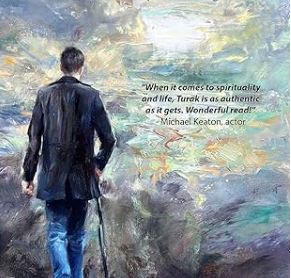August “Augie” Turak was the first student of Richard Rose and played an key role in introducing me to the spiritual search through his founding of the Self Knowledge Symposium. Thus, I was happy for the opportunity to interview him in support of his new book, Not Less Than Everything: One Man’s Quest for Spiritual Enlightenment, a true spiritual adventure story designed to “reintroduce the miraculous” into the dialogue of spirituality.
Augie’s work via the August Turak Foundation carries the inspiring message to “bring a transformative message of higher meaning and purpose to a Western Culture increasingly bereft of meaning and purpose.”
In this episode, August Turak offers dozens of quote-worthy statements about spiritual experiences, enlightenment, the purpose of life, how to shorten one’s spiritual quest, prayer, and more.

Please feel free to leave comments or send an email with the contact form. I always appreciate hearing your thoughts.
- Listen to the interview on iTunes, Spotify, Amazon Music, or Google Play.
- Stream by clicking here, or download after you follow the link by using right-click and then “save as.”
- Or watch on YouTube.
- As a thank you for visiting, enjoy free shipping and get a signed copy of my book Subtraction: The Simple Math of Enlightenment for only $13.95.
- If you enjoy the podcast, consider supporting it by purchasing a book, t-shirt, or film at the store.
QUESTION(S) OF THE DAY: What was your favorite quote or lesson from this episode? Please let me know in the comments.
Selected Links and Topics from this Episode:
- Augie Turak’s first book was Business Secrets of the Trappist Monks
- Augie explain some of his writing process, using a writing coach, using his time during COVID to finish the manuscript, becoming the protagonist of his own story, the importance of “set and setting” in telling a story
- Augie Turak’s second book was Brother John: A Monk, a Pilgrim and the Purpose of Life, based on his Templeton Prize winning essay “What is the Purpose of Life?”
- The role that depression played in Augie’s spiritual search. Looking for cosmic consciousness to cure himself of despair
- The devolution of religion into a focus on “health, wealth, and progeny”
- Augie’s book as a counter to a culture “Beset by doom and gloom and dystopia”
- “The Poison We Pick” – Andrew Sullivan’s article describing the spiritual crisis at the heart of the opioid crisis
- The ultimate purpose of life is enlightenment – a journey from selfishness to selflessness
- The Hero’s Journey – the call, resistance to the call, the desert, the great trial, death & rebirth, the return to help others
- We’re all longing for transformation. The 3 forms of transformation: condition, circumstances, and a transformation of being. The latter is what we’re all longing for
- The death of the ego, enlightenment, is the ultimate form of selflessness. But you cannot consciously surrender. “We want a guarantee that if we let go, then we’ll find God. That can’t be done.”
- The long development of the vector that guarantees that when the day comes, “you let go in the right way.”
- Richard Rose said “you have to attack the gates of heaven with everything you have. You will fail. Those gates don’t swing in, they only swing out. You have to have some help from the other side. Mystics call it the ‘magnificent defeat.'”
- The Ego and the Dynamic Ground: A Transpersonal Theory of Human Development by Michael Washburn – a terrific book
- How to shorten the span of despair that leads to enlightenment.
- Learn to “hit the wall faster.” Try to be honest, just being mindful is not going to cut it.
- “Nobody wants to go to ‘the Desert.’ You have to go to the Desert.”
- “Get a group, a community.”
- “Get a teacher.” Their job is to disillusion you. To rid you of illusions. “Deep down inside, we are terrified that if we lost all of our illusions there would be nothing left.”
- “Get a group, a community.”
- “Nobody wants to go to ‘the Desert.’ You have to go to the Desert.”
- “It’s very frustrating to work with a good teacher.”
- Learning to create, conserve, control, and focus your energies
- There are a lot more lousy students than lousy teachers
- The importance of being coachable. “Americans are fundamentally uncoachable.”
- “Are You Coachable? The Five Steps to Coachability” an article by August Turak
- Richard Rose quote: “Make your entire life a prayer and it will be answered instantly.”
- “The ultimate form of therapy is ‘who am I?'” The games you’re playing originate in fear and all fear comes back to death.
- The Denial of Death by Ernest Becker
- Mellville’s Moby-Dick: An American Nekyia – the book Augie carried with him prior to his experience in Baltimore
- Mystics and Zen Masters by Thomas Merton, one of the best books on mysticism you can read
- John Blofeld’s introduction to The Zen Teaching of Huang Po, another one of the best things Augie ever read
- The Trappist Monks of Mepkin Abbey
- “What would it be like to give myself totally to God?”
- “The absolute essence to a spiritual path is commitment”~ Bob Cergol
- 90% of what Richard Rose taught was lifestyle – “living the life”
- “Spirituality is fundamentally countercultural”
- The friction is what breaks the ego – it’s not technique, it’s the pressure the ego gets under when nobody understands you, you have no one to turn to
- Rose’s most controversial philosophy was that “results are proportional to energy applied.” The vast majority of people go into spirituality to escape the harsh realities of life. And the harshest reality of life is that results are proportional to energy applied.
- August Turak confirms he is not Jed McKenna
- Keep up with August Turak at augustturak.org
- Check out my new t-shirt design: Christ in the Desert
- Leave a review on Amazon of my book Subtraction: The Simple Math of Enlightenment. We’re now at 148 reviews, and your help will make it 149!




